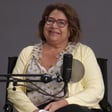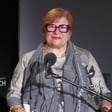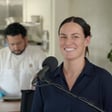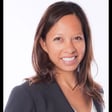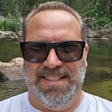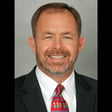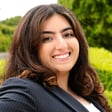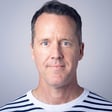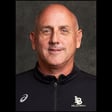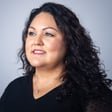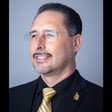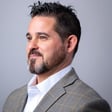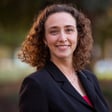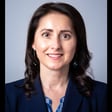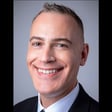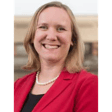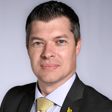Become a Creator today!Start creating today - Share your story with the world!
Start for free
00:00:00
00:00:01

"Changing the World, One Engineer at a Time"
Dean Jinny Rhee discusses the College of Engineering and its "highly coveted" graduates.
Transcript
Introduction to the Beach Community Podcast
00:00:17
Speaker
Hello and welcome to At the Beach. I'm Dan Montoya, Vice President of University Relations and Development here at Cal State Long Beach. This podcast is where we share stories, updates, and meaningful ways to connect with and support the beach community.
Meet Dr. Jenny Reeve, New Dean of Engineering
00:00:32
Speaker
Today i am especially excited to welcome our guest, Dr. Jenny Reeve. She is the Dean of the College of Engineering. Jeannie joined us in July 2021, bringing an incredible blend of experience in engineering education, student success, and strong partnerships with industry and alumni.
Dr. Reeve's Academic and Athletic Background
00:00:52
Speaker
She earned her bachelor's, master's, and doctorate degrees in mechanical engineering from Stanford University. But here's something that you may not know. She was also a standout student athlete in gymnastics at Stanford, going head to head with Olympic legends like Mary Lou Retton and Julianne McNamara.
00:01:12
Speaker
After her time at the farm, she moved down the road to San Jose State where she became a professor and then associate dean in the College of Engineering. Her research focuses on renewable energy, thermal systems, and strategies to help engineering and STEM students thrive.
Advocacy for Student Athletes
00:01:30
Speaker
Jenny, it's so good to have you. Welcome to the podcast. Thank you so much for having me. That's quite a dossier you have on me. Yeah, we we kind of do our homework, and we want to make sure we know who we're talking to and all the great stuff that they do. So, yeah, I didn't know that about you, but i'm not surprised. I think you are a very high achiever, and so I think that is a testament to that as well. Oh, thank you so much. And I'll just say for the record that I'm delighted to be at the beach after being on the farm. Yeah.
00:02:03
Speaker
That's great. Jenny, when you when you meet student athletes here, does it take you back to your days as a gymnast? What did that experience teach you and how do you still get a little sentimental?
00:02:15
Speaker
I definitely feel an affinity towards our student athletes on campus. In 2022, one of our mechanical engineering majors placed eighth at the U.S. figure skating competition.
00:02:27
Speaker
His mom had asked me if he could get priority registration to work his classes around his practices, and I advocated for him as strongly as I could. I would say being a student athlete myself was a defining experience in my life.
00:02:40
Speaker
I remember at the time actually being insecure about it and thinking that I wasn't as smart as my classmates because I had gotten into Stanford as an athlete and not because of my academics.
00:02:52
Speaker
Little did I know at the time, everybody there felt insecure about something. And it's perfectly normal to feel this way when you start something new. I, of course, spent so much time with my teammates, and we are still very close to this day, even more than 35 years later, as a result of that shared experience.
00:03:09
Speaker
And now that I'm a dean, I realize how important it is to have that community and that place where you belong when you're in college. It's one of the factors that leads to success in college and beyond. um We're going to go through a series of questions, and so we'll just dive in.
Family Influence on Dr. Reeve's Career
00:03:24
Speaker
Jenny, for listeners who you are getting to know, what first drew you to engineering, and how did that passion evolve into your current role as the dean?
00:03:36
Speaker
Well, Dan, um I have engineers in my family. ah For example, my dad was a professor of electrical engineering, and my mom was a computer programmer for NASA Goddard.
00:03:46
Speaker
ah My dad basically knew how to fix or to make anything, and my mom was basically the female version of that. Wow. I think it's only natural that some of that rubbed off on some of us four kids.
00:03:59
Speaker
um Also, as you mentioned, I was a gymnast in my youth, and I was fascinated with the physics behind movement. For example, did you know that if you run twice as fast, you will be able to tumble or to vault four times as high?
00:04:12
Speaker
Wow. Yeah, that's pretty cool, right? That's totally worth it. And hopefully all of the engineering majors out there are nodding their heads because they know that that's just the kinetic energy of convergent potential energy.
00:04:24
Speaker
Nice. So let's talk a little bit about, you know, I know your parents, your dad was engineering, your mom, very similar. But what is it about engineering that drew you to that field? Like, i mean, especially mechanical, like, what what was it about it that, like, caught your attention? It was that sparked you to say, yeah, I want to do this.
00:04:44
Speaker
I've always liked math and science and I loved drawing things and designing things. So I think it was a natural progression into a major like mechanical engineering.
00:04:56
Speaker
I also like the aspect of it where you help people yeah and you design things to make life better. So let's let me dig even deeper to that. um My son, he's he's getting ready to transfer, and he's studying engineering. He wants to study mechanical as well.
00:05:12
Speaker
But I always walk around everywhere we go, and I say, you know what? Everywhere we go and every structure, every building cart, an engineer touched it in some way, shape, or form, right? They they had something to do with it and in the design. So let's let's talk a little bit about your time at San Jose State.
00:05:31
Speaker
What's a moment or lesson from your time there that still shapes your leadership here at Long Beach? As an associate dean at San Jose State, I was in charge of the student success programs in the college.
00:05:43
Speaker
I would say that that body of work is what shapes my work at the beach. Students must be the top priority of every decision that we make because basically they are the reason why we are all here.
00:05:54
Speaker
And to do this, I think we have to invest in our employees so that they have what they need to effectively serve students. right I agree with you 100%. Yeah, that's great. And so now that you're here, you are the dean, the one calling the shots for all areas of engineering.
00:06:12
Speaker
And so you've been here nearly four years now. What's your vision for the College of Engineering and how do you know we're making progress?
Vision for Future Graduates
00:06:21
Speaker
My vision for the College of Engineering is and always will be to produce what I call coveted graduates. um So these are graduates that will be in demand by society.
00:06:33
Speaker
They will power the important industries and economies in the region and beyond. Some of the signs that we are successful might include things like um high social mobility and program rankings, um a high internship and job placement rates of our new graduates.
00:06:49
Speaker
um Also, if we have alumni in the world who are successful and are thought leaders in their field, that might be another measure. um Also, if we have cutting edge curricula, research, and labs that enable the transformative project-based learning that we um believe in that might be another sign.
00:07:08
Speaker
That's great. Yeah, I know. i know you spend a lot of time developing all your areas of engineering, and and i I am so excited when I see them at commencement and seeing coming through. But more importantly, to hear the alumni that you're working with on your alumni or engineering board.
00:07:25
Speaker
And i know i so i know some of them and some of the great, amazing things that they do. But then also i get to get to experience some of your students as well. So i think I think you're producing amazing folks as well. Well, can I talk about my big dream before we we move on? Absolutely. Go for it.
00:07:41
Speaker
So my big dream for the College of Engineering is to attract a naming opportunity for the college. I think that the right partnership would leapfrog the college into the next tier by accelerating in-demand curricula, the cutting-edge research and industry collaborations that are needed, and ah student-centric programs.
00:08:01
Speaker
um And also equally critical are the modern facilities designed for collaboration that we need to make it happen. So let's let's talk a little bit about that. why Why is it important for a naming of ah of a college? what why is Why would it be important for us to name a college?
00:08:19
Speaker
A naming ah provides both the partnership and the resources needed to make long-term and strategic investments in these programs of priority. Right. And I also think it's important ah and in the partner we choose, right, because it's usually it's usually a prominent alumni or or maybe ah a corporation or somebody who who has a really strong reputation in the area, which I think would be good. I think you're looking somewhere around, what, 35 million or so around there as a ballpark to name it.
00:08:50
Speaker
um We could certainly do it for that amount. Yeah, and and i think I think that is is amazing because it it brings many things. It brings program support, faculty support. It would bring scholarship support and even even some of the ah student programs and that they work on on a regular basis to get the, not just the theoretical, but the practical part of it which I think would be amazing. And I would love to see that happen. I would love to work with you to make sure that happens. Absolutely.
00:09:19
Speaker
As part of that, you know we have we have you have ah strong partnerships already with the aerospace industry. Talk to us a little bit about that and what you're doing to further build those relationships and expand that aerospace relationship.
Aerospace Partnerships and SharkSat Project
00:09:33
Speaker
Yeah, the plan there is to lean into into our industry partnerships and our faculty experts. They basically know where the industry is headed, and we are planning to meet them there in the future. We have a major renovation in the design phase, which includes a brand new satellite lab.
00:09:50
Speaker
Our students are building our very first CubeSat. So this is the first satellite project that we've had at Cal State Long Beach. It's affectionately named SharkSat, and hopefully this will be the first satellite of many.
00:10:02
Speaker
This one will monitor blue light pollution across Earth and will hopefully be in orbit in 2026. We're also building a rocket lab, a drone cage, and an advanced manufacturing lab as part of the renovations.
00:10:15
Speaker
Yeah, that's that's amazing. And, you know you know, sometimes at the CSU we can't always build buildings, right? So sometimes we need to renovate. So I think this is ah a great opportunity, a great space for students to get that practical experience. And I think if if we are renovating and in becoming relevant and staying relevant on on a regular basis, then we provide the students so with all the amazing things they need.
00:10:38
Speaker
I know this project has been something you've been working on What is the project cost and and and where are you in in the project as far as completion? We have an estimate of a $15 million dollars price tag for this renovation project. We've raised about $9 million dollars of it and we have over $2 million dollars of it pending.
00:11:00
Speaker
And of course, we are working hard to raise the remaining amount needed. Right. And you need this by next year, right? Correct. we're We're hoping that we can start construction sometime in spring 2026.
00:11:12
Speaker
Good. and then but But what this means, though, for the students is, those again, those great opportunities to do the real-world practical ah exercises that they need to get out in the industry, right? So what with this renovation and all the things that are going on there, in addition to aerospace, what other what are the industries will it feed? Right.
00:11:33
Speaker
Well, we are also building co-laboratory space where we're going to co-locate all of our faculty who do research requiring a chemical fume hood. So our biomedical engineering faculty might go in there. Our chemical engineering faculty might go in there. um Also, we have faculty from other disciplines who do battery research or photovoltaics.
00:11:53
Speaker
or um thermoelectric materials. So we're hoping that this would serve as a hub for collaboration, mentorship, idea generation, and it will go on to serve biotech, our energy industries, and other related areas.
Women in Engineering Conference Initiatives
00:12:10
Speaker
That's great. and And see, that's what I love about um the College of Engineering. There's so many things that a lot of people don't even know about. So I'm so glad you're here talking about this because, you know, our students go to so many industries and so many companies and make a direct impact. You know, that's one of the beauties of students that come from Cal State Long Beach and even the CSU as a whole. Because I remember i used to be a fundraiser for engineering. and And some of the questions that I would ask our industry folks is,
00:12:39
Speaker
Why hire somebody from the CSU? what What makes them different from any other person you hire? And the industry folks would say, you know what? Others that come from maybe some of the UCs or private institutions, they say they they're so strong on the theoretical. They're very polished and They can come in and and they want to run the company. you know, it's it's a little different mentality. But CSU students are are maybe not as polished.
00:13:06
Speaker
But when they when it comes to the work, they know how to do it. And they hit the ground running. and Before you know it, they they are so far advanced than the other ones that they they kind of self-promote themselves and and continue to grow into that management, um the management tiers of the business, which which is where they want to be anyway.
00:13:28
Speaker
But I think what you're doing, you're just setting the stage for all of that. Yeah, I think that's one of the reasons why we believe so strongly in our project-based learning philosophy. the Some of the support that we've received provide the resources that allow our students to take a crazy idea and take it from a design phase all the way to the prototype stage.
00:13:48
Speaker
And we know that when you're making something in real life, that a lot of learning occurs there, both in the hard skills and the soft skills. Yeah. Yeah. And another thing people don't realize or or maybe young people don't realize is when you come to college, college, all it does is teach you how to think. Right.
00:14:04
Speaker
And so I think with engineering, you are preparing them not only to think, but apply. And I think that that is also a differentiator as well. Let's talk about student success for a moment.
00:14:16
Speaker
Programs like BEST, the Beach and Engineering Student Success Team and Program. And they're really making an impact. But what tell us a little bit more about that and the students that are involved in that program.
00:14:28
Speaker
Sure. The BEST program is a cohorted freshman learning experience where a freshmen take some of their courses with the same group of 25 students. It's been in existence for over 10 years, and it's one of our flagship programs. It provides math achievement support and facilitates the formation of study groups and friendships.
00:14:49
Speaker
It's a way to ease the transition from high school to college. We know that completing calculus in the first year and feeling like you belong in college are both critical factors to success in engineering degree programs.
00:15:02
Speaker
And that's one of the goals of ah the BEST program. We also know that students in the BEST program outperform the rest of the college on average. And and we know the coursework is tough, right? So how does do how do students stay motivated to try and get to the finish line? Because, you know, engineering is not like the other majors. It's a lot of lot of math, a lot of, like you said, physics and so on and so forth. They're tough.
00:15:27
Speaker
how do they How do they navigate that? Well, for this, I have to give credit to our incredible faculty and staff. We strive to provide those transformative project-based learning opportunities, both in the classroom and through extracurricular activities and competitions.
00:15:44
Speaker
We also have over 30 student organizations, and they provide opportunities for students to learn from each other over shared interests. We also have an internship coordinator.
00:15:55
Speaker
So an internship is a known high-impact practice. And it motivates students to stay on track and to graduate. Yeah, the internships are so important. So if you're listening out there and you have a company or or you have opportunity to provide internships for our students, we'd love to connect with you on that. it It's so important for our engineers.
00:16:14
Speaker
Engineering was traditionally, it's traditionally been male dominated, but you've worked to shift that in so many ways. Programs like Women in Engineering Conference. And I know you've brought some amazing women engineers to that field. Talk to us a little bit about that and how you want to continue to grow that and what's next. We just held our fifth annual Beach Women in Engineering Conference here at our lovely student union, and it was a huge success. We had about 400 attendees wow and speakers from a wide range of engineering fields.
00:16:47
Speaker
So women still earn about 20% of the bachelor's degrees in engineering and computer science in the U.S. And on top of that, we know that they're much more likely to drop out of the engineering workforce within five years of entering it or to never enter it at all. Wow.
00:17:02
Speaker
This is a problem both for its impacts to society and, of course, the inequitable opportunity cost. For example, our keynote speaker at our most recent conference points out that if women are not at the table when the new AI technology is being developed and trained,
00:17:19
Speaker
it is very likely to learn and incorporate inherent biases. Or at the very least, it won't be reflective of the perspective of 50% of our population. So that's an example of why women also need to be at the table in this problem-solving profession. The College of Engineering at Long Beach is about 23% women now, compared to 20% when I started in 2021.
00:17:42
Speaker
Although it doesn't sound like a big increase, it is significant given that we have over 6,000 students. I'm seeing a measurable and consistent uptick in the percentage of women in our entering classes, and it will just take some time before the increases propagate through our programs and through our student body. So I'm hoping that it's possible that our conference is providing some effective outreach in this regard.
00:18:03
Speaker
That's good. And congratulations on that increase. I think a lot of, like you said, a lot of people may not think it's significant, but in you seeing the day-to-day, it is significant. And I think it's great. It's awesome to see that diversification of male-female ratios and as it continues to grow and evolve. So I look forward to to seeing that and and developing that alongside with you as well.
00:18:25
Speaker
You've done a great job at building industry partnerships. What one collaboration would you would you say you are particularly excited about
Beavers Charitable Trust and Industry Pathways
00:18:33
Speaker
right now? And how is that going and and how is it opening doors for students?
00:18:37
Speaker
Gosh, we have a number of exciting partnerships. I think it would be impossible for me to just pick one. um But for the sake of this interview, ah let me go with the Beavers Charitable Trust that supports us in the area of heavy civil construction. The Beavers Trust is a conglomerate of heavy civil companies, including Granite, Sukut, Herzog, etc. And many of those companies do donate directly to us as well and sit on our advisory council.
00:19:04
Speaker
The Beavers Trust supports an endowed professorship at Cal State Long Beach. And they recently supported the creation of a minor in heavy civil to create a pathway into these jobs for majors outside of civil engineering and construction management. It provides a pathway for our students to enter a lucrative field, and it develops the workforce that this field desperately needs. Yeah, and and civil engineering, construction, management, those are those are some good jobs.
00:19:27
Speaker
What they do is so amazing because, they again, they build a lot of our structures and and infrastructure that we need on a day-to-day. I remember working with a geothermal civil engineer. and I was like, what is that?
00:19:42
Speaker
And it is so important in in the development process of of land and and things that we never even think about. If somebody was considering, you know, coming to Cal State Long Beach and considering engineering as a major, what what would you say, how would you invite them in to say, you know, come come visit us, come see us, here's here's all the things that we're doing?
00:20:04
Speaker
We'd love to have you. and And when you walk away, you're going to walk away with this kind of education. I would say reflect on your high school years. Think about which science and math disciplines appealed to you, because engineering basically is an application of math and science. If you liked the first physics class on mechanics, you might think about mechanical engineering or civil engineering um or aerospace. If you like the second physics class, which is on electricity and magnetism, you might look at electrical engineering or computer engineering.
00:20:36
Speaker
Of course, if you like biology, we have biomedical engineering. If you like chemistry, we have chemical engineering. If you liked math, if that was your favorite, then computer science might be a major that you might want to look into.
00:20:48
Speaker
And I'm sorry, what was the second part of your question? No, I was just going to say, in what kind of student do you say the beach produces? Yeah, so at the beach, as I mentioned before, we strive to give you a very practical, hands-on, project-based education where you can take the theory to practice. They are coveted by the industries for that reason.
00:21:10
Speaker
There's a space for everybody, right? It it really covers a wide range of careers and opportunities. And I think anybody can come here and and find a place and in an opportunity.
00:21:21
Speaker
Talk to us about leading the college. I mean, that is that is a lot of work. To me, I always... Think about it as the toughest, one of the toughest jobs here on campus. Talk to us about your leadership in in the college and, you know, maybe as and you can reflect on some of the experiences you've had, like maybe gymnastics or some of the other things.
00:21:44
Speaker
ah professions you did and and i say gymnastics because it takes a lot of discipline takes a lot of really just attention to detail just ah consistency and so i'm sure a lot of that is is kind of already built into who you are so how are you how are you using all the experiences that you've had to continue to lead the college in in the way that you are I would say one of the best things about working in higher education and in academia is to nurture new talent and to watch them to go on and be successful. So that's basically my purpose for being here.
00:22:23
Speaker
And as the Dean of Engineering, I can lead the changes that will allow us to do that at scale. So I think that's really exciting and fulfilling. Now, let's talk about, you mentioned a little bit about philanthropy and you you listen you mentioned a couple of the partnerships. what What are your most significant or maybe your top priorities for philanthropy and what what are you looking ah for partners or donors to come in and help you with?
00:22:52
Speaker
I would say that donor support is what allows us to go from a basic state-supported college to a College of Engineering 2.0. So it allows us to have a robust scholarship program, the BEST program, the Women in Engineering Conference, and the Senior Design Project Expo. And as I mentioned before, it allows our students to take a design concept and have the resources to actually build that prototype. We know that a lot of learning occurs between that design and the prototype and it's an amazing resource for them to have a bit of funding to make that happen. It supports our faculty and our facilities and it enables them to advance knowledge and innovation in the world. Yeah, no, I think that's great. If if somebody was was trying to give money and say, well, how do I get in contact with the College of Engineering? how How could they get in contact with you or or Cheryl?
00:23:46
Speaker
Well, we're very easy to find online. Just search for Dean of Engineering ah Cal State Long Beach. But yeah, I'll give a shout out to my amazing fundraising team. So Cheryl Ward is our Director of Development and Parashah is our Development Coordinator.
00:24:01
Speaker
Yeah, no, I think they're they're really good and and they are continuing to work hard to build those philanthropic relationships. What are the key priorities? So, you you know, scholarships is important.
00:24:12
Speaker
You have, you know, an endowed chair and chairs or professorships. we We talked about naming the college. What are the areas can people support with at the college? Well, as I mentioned, we are still trying to raise the last bit of money for our lab renovation project.
00:24:29
Speaker
And so I think that is ah an amazing opportunity. When you get to your goal, then you will be able to start construction or will it start before that? Correct. We're planning to do the construction in four different phases.
00:24:42
Speaker
So we do have the money to start the first couple of phases and we hope to have the remaining amount by the time the next phases are due. Awesome. Now let's dig a little deep maybe into who you are. What what drives you or motivates you to approach the work that you do? is it Is it something that, is it because of the students? Is it because of your work ethic? Is it because of you've been inspired by somebody along your journey in life?
00:25:13
Speaker
What is it that keeps you motivated to do what you do? I would say that the mission of the California State University system in general is a compelling one for me. I really see how we ah provide social mobility. We provide access to higher education that might not otherwise be a reality.
00:25:33
Speaker
We uplift and transform the lives of students and the communities that depend on them. And I think that's a noble cause. Yeah, I think so too. and And I think that's a lot of reason why those who work here at the university are vested in it. And it's really about the students and their success and their growth.
00:25:51
Speaker
Before we close, is there anything else that you'd like to share about your team, your students, or what's ahead for the College of Engineering? Well, I would just say, watch out world. The College of Engineering is on the rise.
00:26:03
Speaker
That's good. I think you're doing a great job. I think where the College of Engineering is headed is is very promising. I think the caliber of students that we are producing here at Cal State Long Beach are second to none. And so we're excited for the great things that are happening in the College of Engineering and all the work that you're going to do.
00:26:22
Speaker
And so we we thank you for being here, for sharing your story. Is there any upcoming events that people may may want to put on their calendar? Sure. we're having a resume and interview workshop on April 29th for computer science and related majors. So I would welcome ah volunteers for that event if there is anybody out there who would be interested. Our Senior Design Project Expo is on May 8th, so we're busy getting ready for that. And of course, we're looking forward to our commencement.
00:26:55
Speaker
Marwan Fawaz, the former CEO of NEST, will be our speaker. Nice. Yeah. No, and and you you are usually the first one up in the commencement. So engineering kicks it off and it's a big group and ah a very diverse group, one but some people from all over the world.
00:27:12
Speaker
It's a very amazing group that comes through and I get to see them all the time. So Actually, we're we're going second this year. Are you? are you We got knocked down from the first one. see. Well, either way, I think engineering is going to represent well, so we look forward to that.
00:27:27
Speaker
ah Jeannie, thank you so much for joining us today. It's been a pleasure. This wraps up another episode of At the Beach. I'm Dan Montoya, Vice President of University Relations and Development. This is a podcast produced by my division, and we want to thank iSpace team for letting us record here in the studio. They're always generous to to have us.
00:27:47
Speaker
Also for my right-hand man, Jeff Bliss, for helping put this together, as he always does. And as we always do, we want to close out with a little Go Beach on 3. One, two, three.
00:27:59
Speaker
Go Beach!
